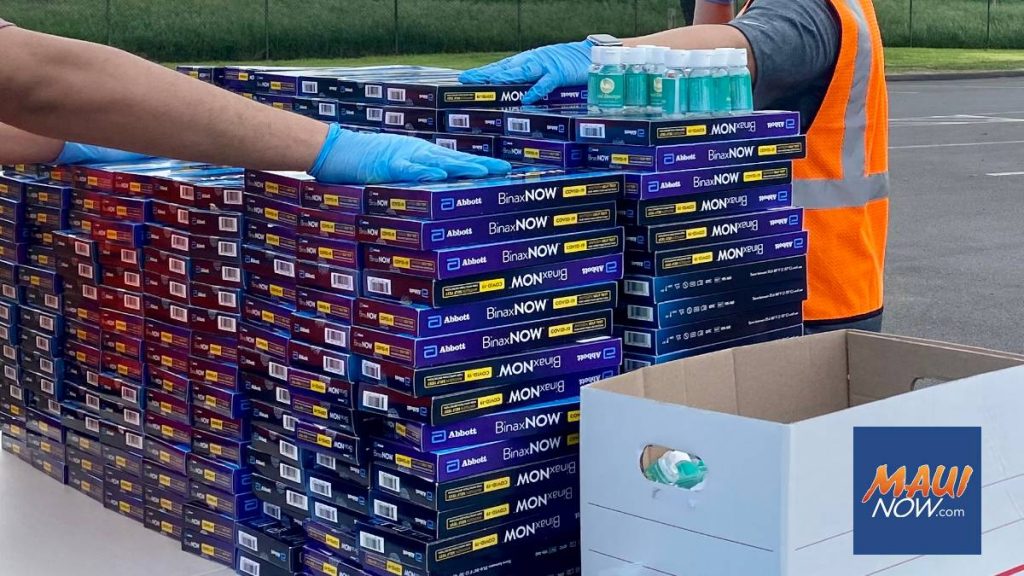Maui experts explain when to take PCR versus take-home tests as cases soar

With the recent surge in COVID-19 cases, take-home COVID-19 tests kits have once again sold out at many local retailers and pharmacies.
Meanwhile, people waited up to four hours or so Wednesday afternoon to get a free BinaxNOW COVID-19 take-home test kit, which was distributed by the County of Maui in Wailuku. About 1,200 boxes were given out, each containing two antigen tests, county spokesman Brian Perry said Thursday.
While take-home tests have been soaring in popularity, it’s important to know when to use the antigen test and when to go through the trouble of finding a provider that administers a “gold-standard” PCR or polymerase chain reaction test. Also, some employers require a negative PCR test before returning to work after exposure or illness.
Owner Amanda Prouty and medical director Dr. Lane Thaut of Maui-based Minit Medical answered questions this week about several kinds of tests, including antigen home tests, NAAT (nucleic acid amplification test) tests and PCR tests. With clinics in Lahaina, Kīhei and Kahului, Minit Medical often partners with the county as well as with Maui Memorial Medical Center and other groups to provide COVID-19 testing.
Q: Can you describe the main differences between at-home, rapid antigen tests and PCR tests collected by providers? Also, can you explain other types of tests?
ARTICLE CONTINUES BELOW ADA: “Home tests are self-swab antigen tests that require step-by-step instructions to complete. They can be taken anywhere and produce rapid results. They require adherence to the specific instructions and correct sample collection to be accurate. Often home tests require serial testing with two tests spaced apart. Home testing may need confirmatory testing with a PCR test when available.
Rapid antigen tests collected by providers use the same technology as the at-home kits. They produce a rapid result. They have similar sensitivity and specificity for COVID-19 as the home kits but the result can be more accurate because they are obtained by trained personnel and run in a lab.
Rapid NAAT tests — such as the Abbott ID NOW tests — are molecular tests comparable to the PCR test, which provide rapid results. These tests are slightly more accurate than the antigen test and are obtained by trained personnel and run in a lab. These are normally the tests provided at the free community test drives run by Minit Medical.
PCR tests that are collected by providers are the gold standard of COVID-19 tests available. These are the most expensive type of test. Obtained by trained personnel and sent to a lab and processed via PCR, these test take longer to process, from one to three days. There are rapid PCR tests available as well.”
Q: When should people take an at-home test versus a PCR test and vice versa?
ARTICLE CONTINUES BELOW ADA: “Testing should be performed when symptomatic or exposed to COVID-19. The at-home tests are a faster result and may be more convenient for patients and can be taken when needed.
Home antigen tests come two tests to a box and are meant for serial testing. Testing should be completed 36 to 48 hours between tests.
PCR testing is used when a more accurate test is required or needed such as procedures, foreign travel, invalid results or confirmatory testing. The sensitivity of the antigen test can vary based on the course of the infection. PCR testing is still the gold standard, but can also vary based on the course of the infection. Testing is most accurate when symptoms are present.”
Q: What are the accuracy rates between antigen and PCR tests?
A: “Antigen testing sensitivity is around 84.6% and PCR sensitivity varies around 99%. These numbers are based on symptomatic patients.”
Q: If antigen tests aren’t as accurate, what are they good for?
A: “Antigen tests are still a great tool we have available to detect COVID-19. They are convenient and more available, and are good for serial testing. This makes them a good option when you cannot obtain a more accurate test.”
Q: What are some of the common mistakes or misunderstandings when it comes to finding the appropriate COVID-19 test?
ARTICLE CONTINUES BELOW ADARTICLE CONTINUES BELOW ADA: “There are multiple options available now which can be confusing. Sometimes the types of tests can be mixed up.”
Q: When is the best point in time to take a PCR and / or antigen test?
“The sensitivity of the antigen test can vary based on the course of the infection. Preferably if there is known exposure, serial testing with an antigen should take place every three days from the onset of symptoms.
Early on in an infection, the viral load may be too low to detect via antigen, so testing negative on the first day can be falsely reassuring.
If you are symptomatic, stay isolated and obtain another test three to five days into the illness if you are using antigen testing.
A PCR is the most accurate test at any point during a COVID-19 infection.”
Q: Any other pieces of advice when deciding between the tests or when taking the tests? Many people are taking multiple tests to be sure and it can be stressful to know how to be certain of results.
A: “All tests available are good options, but isolation and infection control are more important. If you have any symptoms even as minor as congestion, stay isolated until your symptoms resolve. Test with the most accurate test you have available and is feasible for you to obtain. If you are sick and test negative, still remain in isolation until you are feeling better.”












